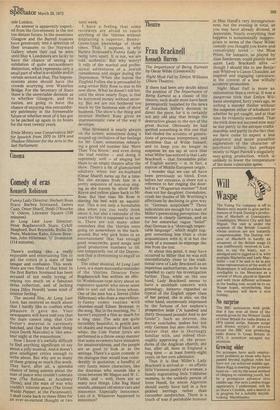Theatre
Frau Bracknell
Kenneth Hurren,
The Importance of Being Earnest by Oscar Wilde (Greenwich) Night Must Fall by Emlyn Williams (Shaw Theatre).
If there had been any doubt about the position of The Importance of Being Earnest as a classic of the theatre, such doubt must have been peremptorily banished by the news of Jonathan Miller's decision to direct the piece, for it is certainly not any old play that brings the destructive gleam to the eye of the great doctor. Obviously he had spotted something in this one that had eluded the scrutiny of generations of previous interpreters, and doubtless that of Wilde himself; and to keep you no longer in suspense let me say at once that what Miller has noticed is that Lady Bracknell that formidable pillar of English society is, in fact, a matron of Middle European origin.
I wonder that we can all have been previously so blind. Even before her entrance, is there not a reference to her ringing the doorbell in a "Wagnerian manner"? And does not her daughter, Gwendolen, crush her doubts of Mr Worthing's affections by declining to give way to "German scepticism"? These indications are enough for a man of Miller's penetrating perception: the woman is clearly German, and as for her somewhat vague "belief" that German is a "thorough respectable language", which might suggest something less than a close acquaintance with it, it is but the work of a moment to expunge the line from the text.
At about this point, it may have occurred to Miller that he was still uncomfortably close to the traditional view of Lady Bracknell as an imperious authoritarian, so he was impelled to carry his investigation further. Thus, while on the one hand, Lady Bracknell seems to have a snobbish concern with genealogy, hitherto regarded as typical of the English upper class of her period, she is also, on the other hand, enormously impressed by the fortune of her nephew's prospective bride ("A hundred and thirty thousand pounds! And in der funds!"). Such an interest, the doctor concludes, makes her not only German but also Jewish. No matter that she is thorougly familiar with, and indeed thoroughly approving of, the procedures of the Anglican church; she has, after all, been in England a long time — at least tventy-eight years, on her own admission. Thus it is that Miller's Lady Bracknell is arrived at an affable little Viennese pastry of a woman, a fussily ingratiating little Yiddisher momma, in the unlikely person of Irene Handl, for whom Algernon should surely have laid in a few pickled herrings rather than cucumber sandwiches. There is a touch of wan if perishable humour in Miss Handl's very incongruousness, but the evening in total, as you may have already divined, deplorable. Nearly everything that happens is nonsensically inappropriate in terms of the Oscar Wilde comedy you thought you knew and conceivably loved the Miss.
Prism, for instance, as played by; Joan Sanderson, could plainly have
eaten Lady Bracknell alive -0' though I should like to see Benja-min Whitrow's Canon Chasuble, an inspired and engaging caricature, in the context of a less wilfully eccentric production.
Night Must Fall is more an exhumation than a revival. It was a dangerous trick that Emlyn Williams attempted, forty years ago, in writing a murder thriller without the suspense either of whodunit or whether he got caught, and at that time he evidently succeeded. That the trick does not succeed now may be due partly to the antique craftsmanship, and partly to the fact that we have come to expect a less simplistic and more plausible exploration of the character of psychotic killers, but perhaps mostly toNigel Patrick's singularly easy-going production, which is unlikely to lower the temperature of the most vulnerable spine.


































 Previous page
Previous page